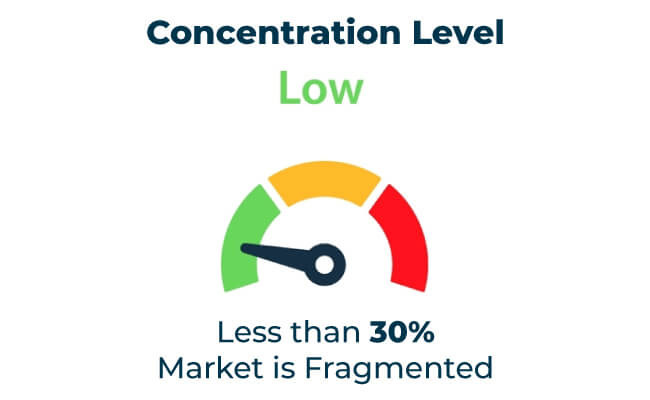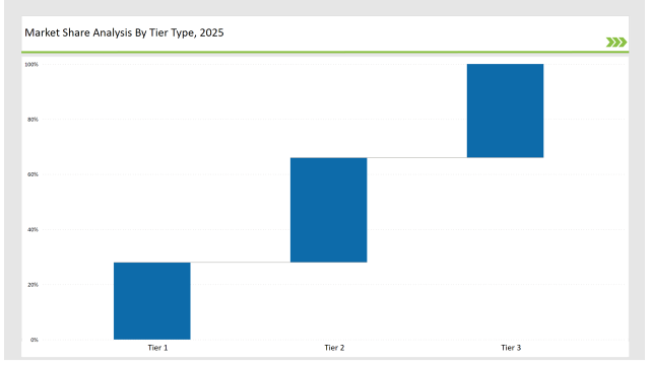The reusable wine bags market is growing rapidly around the world, prompted by the rising demand of the wine and spirits industry for sustainable, durable, and aesthetically pleasing packaging solutions. Companies are classified into Tier 1, Tier 2, or Tier 3 concerning market impact and effective execution.
Leading companies, including TotePack, VinoBag, and EnviroSack, collectively hold over 28% of the market. These top-tier companies leverage innovative materials, sustainability-focused designs, and extensive distribution networks to maintain a competitive edge.
Tier 2 players, such as WineTote, EcoCarrier, and BottleGuard, account for 38% of the market. They focus on cost-effective, customizable, and high-durability wine bags tailored for mid-sized wineries and specialty retailers.
Tier 3 consists of regional manufacturers, startups, and private labels, contributing 34% of the market share. These companies emphasize agility and innovation, introducing biodegradable, compostable, and smart-packaging solutions to meet niche consumer preferences and regulatory requirements.
Exclusive Offer: 30% Off on Regional Reports
Get a free sample report and customize your regions for a 30% discount on your regional report!
Global Market Share by Key Players (2025)
| Category | Market Share (%) |
|---|---|
| Top 3 (TotePack, VinoBag, EnviroSack) | 15% |
| Rest of Top 5 (WineTote, EcoCarrier) | 8% |
| Next 5 of Top 10 (BottleGuard, GreenWrap, CarryVino, FlexiTote, SmartBag) | 5% |

The Reusable Wine Bags Market serves various industries, including:
Companies offer a variety of solutions tailored to industry needs:
Throughout the year, leading companies advanced sustainability by expanding biodegradable options, integrating smart packaging, and investing in AI-driven supply chain optimization. Market leaders like TotePack, VinoBag, and EnviroSack played key roles in introducing plant-based fibers, high-durability recycled materials, and automation for cost efficiency. Many companies also focused on enhancing the reusability and recyclability of their products, reducing environmental impact.
Increased collaboration between manufacturers and wineries fostered innovation in sustainable packaging solutions. Additionally, technological advancements in AI-driven logistics improved supply chain efficiency and reduced carbon footprints.
Check Free Sample Report & Save 40%!
Select your niche segments and personalize your insights for smart savings. Cut costs now!
Technology suppliers should prioritize
| Tier Type | Example of Key Players |
|---|---|
| Tier 1 | TotePack, VinoBag, EnviroSack |
| Tier 2 | WineTote, EcoCarrier, BottleGuard |
| Tier 3 | GreenWrap, CarryVino, FlexiTote, SmartBag |

| Manufacturer | Latest Developments |
|---|---|
| TotePack | Launched fully compostable wine bags (March 2024). |
| VinoBag | Introduced RFID-enabled smart packaging (April 2024). |
| EnviroSack | Invested in AI-powered automation for production (May 2024). |
| WineTote | Expanded premium cotton wine bag options (July 2024). |
| EcoCarrier | Developed lightweight, reusable wine carriers (August 2024). |
Leading companies in the Reusable Wine Bags Market are leveraging advanced automation, AI-driven production systems, and sustainability-focused innovations to maintain their competitive edge.
The reusable wine bags market is growing towards biodegradable materials, AI-powered automation, and RFID-enabled smart packaging. The future of the industry will be decided upon by plant-based fibers, foldable reusable designs, and temperature-controlled wine totes. Sustainability compliance will remain one of the main growth forces for the market, with wineries approaching packaging manufacturers.
Brands are investing in luxury and customized wine bags to elevate customer experience. Advances in digital printing technology make packaging both cheaper and more aesthetically pleasing. Further growth in e-commerce and direct-to-consumer sales continue to send demand for sturdy, yet aesthetically-pleasing reusable wine bags skyrocketing.
Leading manufacturers include TotePack, VinoBag, and EnviroSack.
The top 10 players hold approximately 28% of the global market.
Sustainability, smart packaging, and temperature-controlled wine bags.
RFID-enabled tracking, temperature-sensitive insulation, and AI-driven production efficiency.
Government mandates on plastic reduction, sustainability certifications, and biodegradable material compliance
Explore Packaging Formats Insights
View Reports
Thank you!
You will receive an email from our Business Development Manager. Please be sure to check your SPAM/JUNK folder too.